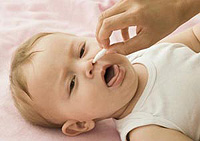Children's diabetes mellitus most often found when the baby is already in a fairly serious condition. How not to miss the Terrible Symptoms and Early Signs of Disease?
Content
The first signs of diabetes in a child
Type I diabetes, namely, it is found in children, belongs to diseases, the predisposition to which is inherited. It is the predisposition, but not a non-affliction itself, which develops only when provoking external and internal factors act on the body of the kid. All causes of diabetes are not identified so far, but it is believed that infection or stress is most often becoming a launcher of the disease.
It would seem that if parents or other child relatives are aware of the reasons and signs of diabetes, because they themselves suffer from them, no difficulties in the early detection of the child should not be. However, unfortunately, the most often the disease is found in
Late stage, when the baby is already in serious condition and vital needs intensive medical events. No matter how sad it is, but at this stage, diabetes is very difficult to treat and causes the appearance of severe complications. The situation is complicated by the fact that children's diabetes has a very short hidden period, and hence there is no time for long-term meditation.
Each adult family member must clearly know the first signs of diabetes in children and be able to soberly assess those health rates that are most important from the point of view of early diagnosis of the disease.
What signs of diabetes should notice the parents?
- Change of appetite:
- The appearance of an unnatural thrust for a sweet one;
- There is often tremance, that is, a child due to a strong feeling of hunger with difficulty withstands the traditional 3-4 hour breaks between meals;
- Weakness and drowsiness 1.5-2 hours after meals.
- The child is losing weight, despite the normal and even elevated appetite.
It is not necessary to write off weight reduction to the fact that the child is growing rapidly, it is better to examine it and make sure that the change in body weight is caused by an increase in physical activity and the growth of the kid's needs, and not the fact that his body is trying to deal with the disease. Despite the fact that in the blood is an excess glucose, the cells of the child's body experience the most severe hunger, because the pancreas in diabetes mellitus practically does not synthesize insulin that the glucose is absorbed by the tissues. - The child quickly gets tired, becomes sluggish, sleepy.
In the absence of high temperature, cough and other signs of cold — These symptoms should be alerted from the point of view of diabetes. - The child begins to drink more and urinate more often, although this symptom is recognized by diabetologists late.
Like salt, sugar attracts liquid, the body, trying «dilute» Sugar, requires water receipt, signaling about this thirst. Sooner or later, with diabetes mellitus, the kidneys cease to hold glucose in the body, it begins to stand out with urine, which in turn leads to an increase in the diurea. Children sick diabetes are starting to get up at night in the toilet, and sometimes urine in bed. - Stains urine on the pot, in the toilet, on diapers become sticky.
This is a purely physical phenomenon, a sugar solution for obvious reasons after evaporation of water leaves after herself sticky stains. Attentive mom will always notice this symptom.
Of course, most children love sweets, and many clone in sleep after meals, but in the case of a genetic predisposition to type I diabetes, these habits may be the first signs of the disease, and their isolated existence may indicate that the disease has not yet come far away, So, it will be easier to treat it.
Nausea, vomiting, abdominal pain, dryness and itching of the skin, signs of neurodermita, stubborn furunculese, pyoderma, violation — This is the late symptoms and the consequences of diabetes mellitus, a sign that the disease has already gained strength and suspend its development will be extremely difficult. But contacting parents to the endocrinologist when the very first signals of diabetes appear, the disease could be revealed in the early stages, even before the work of the pancreas will be distinguished and the level of blood sugar will increase. The time would not be missed and doctors would be able to preserve the children's forces to combat illness and for a full life.
Attention! All adult people should be aware of the presence of diabetes mellitus: Incontacting teachers, teachers, neighbors, friends. First, it will avoid mistakes in the baby's nutrition, secondly, in the event of a sudden deterioration of the state of health, deliver it to a specialized endocrinological department, and not, for example, in an infectious hospital or surgery.










